AI voice tools are transforming e-commerce by automating customer support, simplifying order tracking, and offering personalized shopping experiences. With nearly 49% of U.S. shoppers already using voice search for e-commerce, these tools are becoming essential for businesses to stay competitive. By 2030, the U.S. voice shopping market is projected to reach $50.3 billion. Here’s a quick look at the top tools:
- Yuma AI: Automates 40-60% of support tickets, integrates with Shopify, and offers multilingual support.
- Tidio (Lyro AI): Handles routine tasks, integrates with Shopify, and provides tailored product recommendations.
- Decagon: Excels in complex support, remembers conversation context, and integrates with platforms like WooCommerce and Magento.
- Amazon Alexa for Business: Voice-enabled shopping, order tracking, and personalized recommendations using Alexa devices.
- Azure AI Speech: High-quality speech recognition, custom voice models, and integration with e-commerce platforms.
- Otter.ai: Real-time transcription for customer calls, ideal for analyzing interactions and improving service.
- Google Dialogflow: Advanced conversational AI for chatbots and voice assistants, supporting multi-channel integration.
These tools help businesses deliver faster, more personalized customer experiences while reducing operational strain. Whether you’re a small startup or a large enterprise, there’s a solution tailored to your needs.
How AI Voice Agents Are Transforming E-commerce
1. Yuma AI
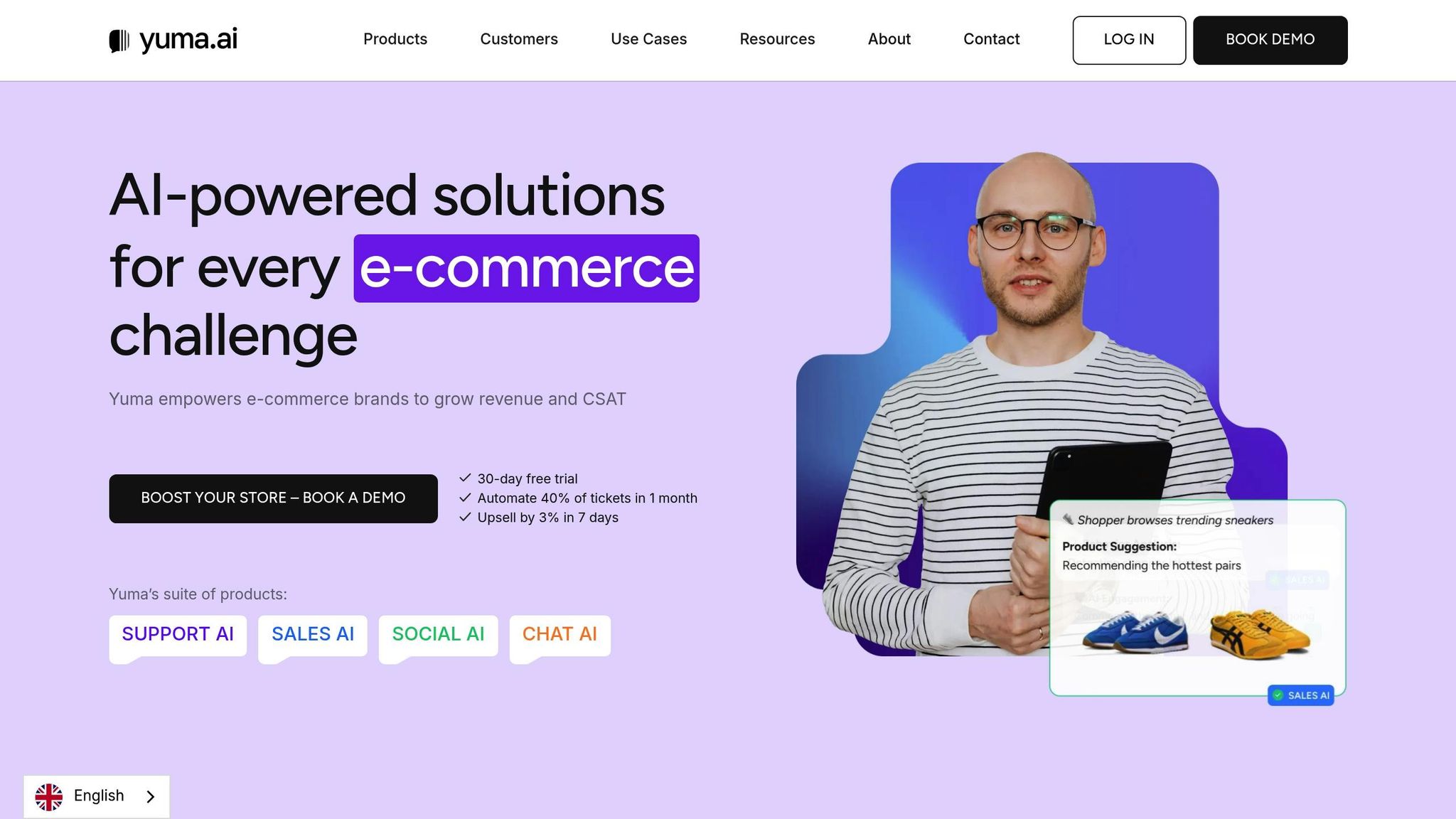
Yuma AI is an Agentic AI platform designed to create autonomous agents that manage large-scale e-commerce support. Unlike traditional chatbots, Yuma AI functions more like human support representatives, taking direct actions to resolve customer issues by pulling data from multiple systems.
Customer Support Automation
Yuma AI tackles a wide variety of support tickets, ranging from simple order status queries to more complex issues like exchanges and billing disputes. Impressively, its AI agents can automatically resolve 40% to 60% of customer support tickets for top merchants using the platform.
With sub-second response times, Yuma AI reduces first-response times by up to 87%. It operates around the clock, supporting multiple channels including email, chat, SMS, and social media.
The platform’s functionality is powered by two main components: AI Agents, which handle tickets from start to finish, and Auto-Pilots, which execute multi-step workflows based on strict Standard Operating Procedures (SOPs). This ensures responses are consistent, aligned with brand standards, and meet customer expectations. Seamless integration enhances these capabilities, making it a reliable tool for businesses.
Integration with E-Commerce Platforms
Yuma AI integrates directly with existing help desk software and e-commerce platforms, giving it real-time access to data and enabling it to perform actions efficiently. For Shopify users, the platform is available as a free installation, making it particularly appealing for businesses already using this popular e-commerce solution.
The integration includes a Process Builder for setting up complex workflows and Custom Actions that adapt to unique tech stacks. This flexibility means businesses don’t need to make major changes to their current systems to take advantage of AI-driven automation.
To ensure safe and reliable interactions, Yuma AI incorporates built-in safety features like Guidelines and Fraud Shield. These tools help protect businesses and customers by flagging sensitive issues or potential fraud for human review.
Personalized Shopping Experiences
Beyond handling support tickets, Yuma AI enhances customer engagement by offering personalized and culturally relevant shopping experiences. The platform supports multilingual and multicultural interactions, making it easier for e-commerce businesses to connect with diverse customer bases.
Yuma AI’s pricing model is performance-based. Instead of charging per seat or ticket volume like traditional platforms, businesses only pay when a ticket is fully resolved. This results-driven approach ensures that businesses are charged based on the platform’s effectiveness.
While public pricing details aren’t available, Yuma AI requires a demo to provide custom quotes tailored to each business’s specific needs and support volumes. This allows for a more personalized solution that aligns with the unique requirements of individual businesses.
2. Tidio (Lyro AI)
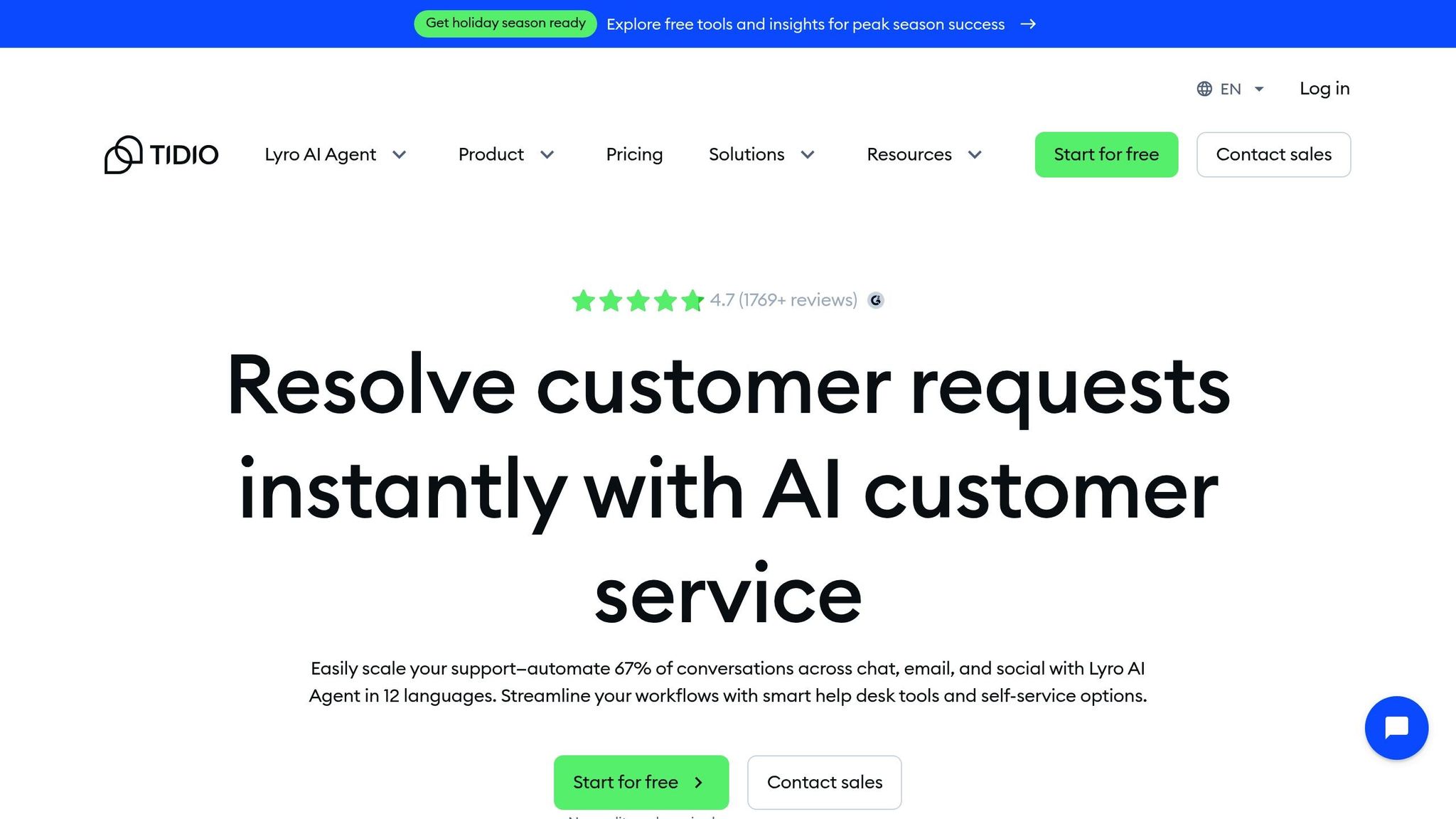
Tidio's Lyro AI is a conversational chatbot designed to provide seamless support for e-commerce businesses. By leveraging natural language processing, it delivers responses that feel more human, ensuring better interactions with customers.
Customer Support Automation
Lyro AI takes care of routine customer service tasks, such as answering questions about product details, shipping, and returns. For more complex issues, it smartly hands off the conversation to a human agent. This balanced approach ensures high-quality service while reducing the workload for support teams. Plus, it operates around the clock and can handle multiple conversations at once, which means shorter wait times for customers.
Integration with E-Commerce Platforms
Tidio works smoothly with platforms like Shopify, allowing it to pull product details and availability directly from the store's database. This means Lyro AI can provide accurate and timely answers about inventory and product specifics. Shopify users also get access to extra tools like product recommendations, cart recovery, and order tracking - features that enhance the customer experience.
Additionally, Tidio connects with email marketing tools and CRM systems, creating a centralized hub for managing customer communications.
Personalized Shopping Experiences
Lyro AI enhances the shopping journey by offering tailored product recommendations based on customer inquiries and browsing history. It also supports multilingual interactions, which is a huge plus for businesses catering to diverse audiences, both locally and internationally. By personalizing suggestions, Lyro AI not only simplifies the shopping process but also helps drive sales.
Tidio offers flexible pricing options, making its tools accessible to startups and larger enterprises alike. This scalability ensures that businesses of all sizes can benefit from its features.
3. Decagon
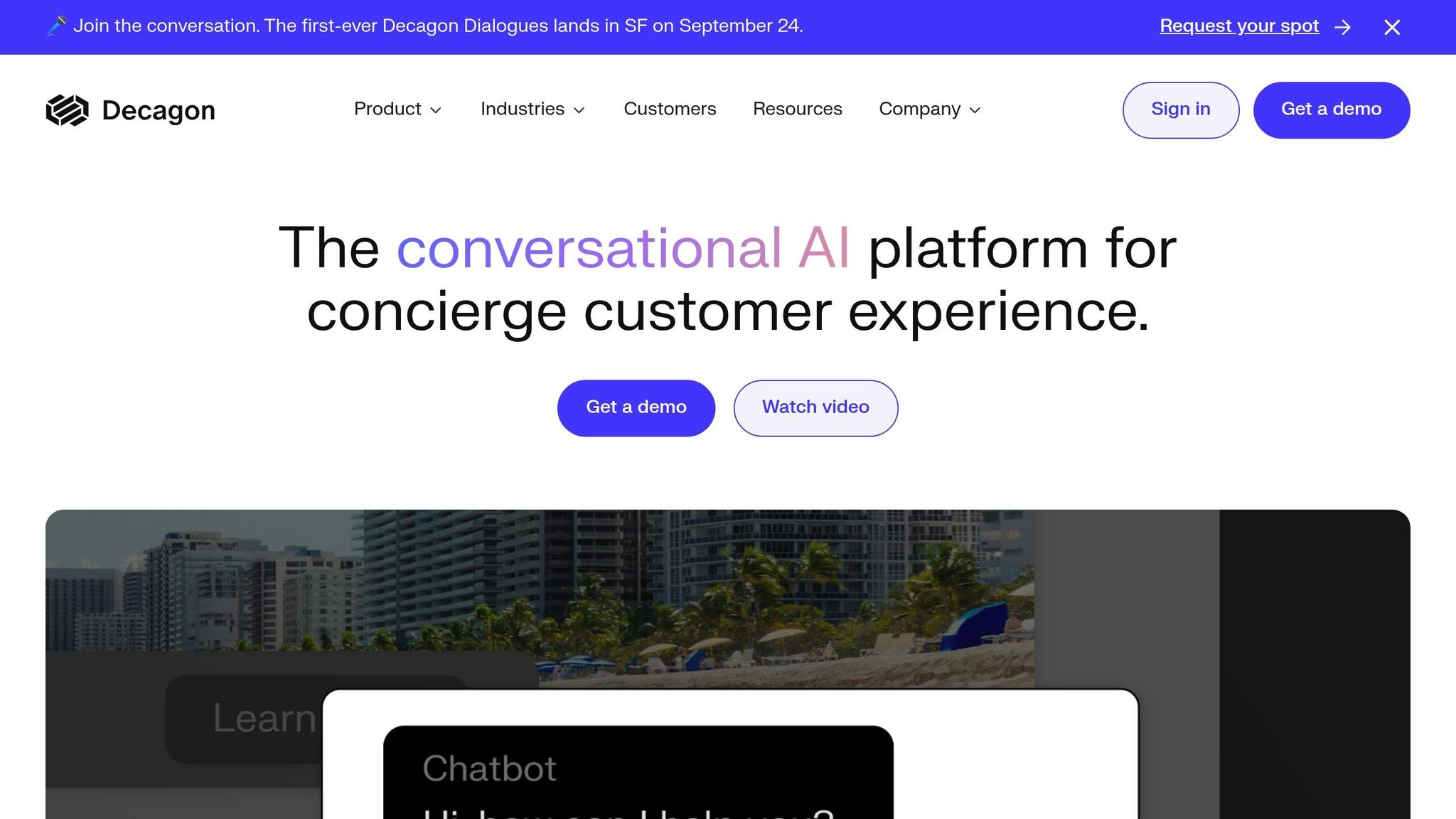
Decagon is a platform powered by AI, designed for e-commerce businesses to tackle complex customer support tasks using advanced machine learning.
Customer Support Automation
Decagon specializes in managing intricate customer inquiries, such as troubleshooting product issues, handling conditional returns, and addressing account-related concerns. It keeps the conversation flowing naturally by remembering context and customer preferences, which reduces the need to escalate issues to human agents. Over time, Decagon learns from interactions, further minimizing the need for human intervention.
One standout feature is its ability to maintain context throughout long conversations. It remembers prior interactions, enabling quicker resolutions and a smoother customer experience. When human involvement is necessary, Decagon transfers the full conversation history to a live agent, ensuring a seamless handoff.
Integration with E-Commerce Platforms
Decagon connects effortlessly with e-commerce platforms like Shopify, WooCommerce, and Magento, drawing on real-time data to provide accurate information about product availability, pricing, and shipping.
It also integrates with CRM systems, help desk software, and inventory management tools, offering a complete view of the customer journey. This means Decagon can reference details like past purchases, warranty information, and prior support tickets to deliver more informed responses. These integrations also enhance order tracking, giving customers a better support experience.
Order Tracking Capabilities
Decagon simplifies order tracking by pulling real-time data from carriers to provide accurate delivery estimates and predict potential delays.
Customers can ask questions like "Where is my order?" or "When will it arrive?" and get instant, detailed answers. The platform also sends proactive updates on shipping progress, delivery attempts, or any delays, cutting down on the number of tracking-related inquiries.
Personalized Shopping Experiences
Decagon enhances the shopping experience by analyzing customer behavior and history to recommend products that match their preferences. It remembers customer choices, making future interactions faster and more personalized.
For returning customers, Decagon quickly retrieves their profile, eliminating the need to repeat basic details. This tailored approach not only boosts customer satisfaction but also encourages additional purchases through relevant product suggestions.
4. Amazon Alexa for Business
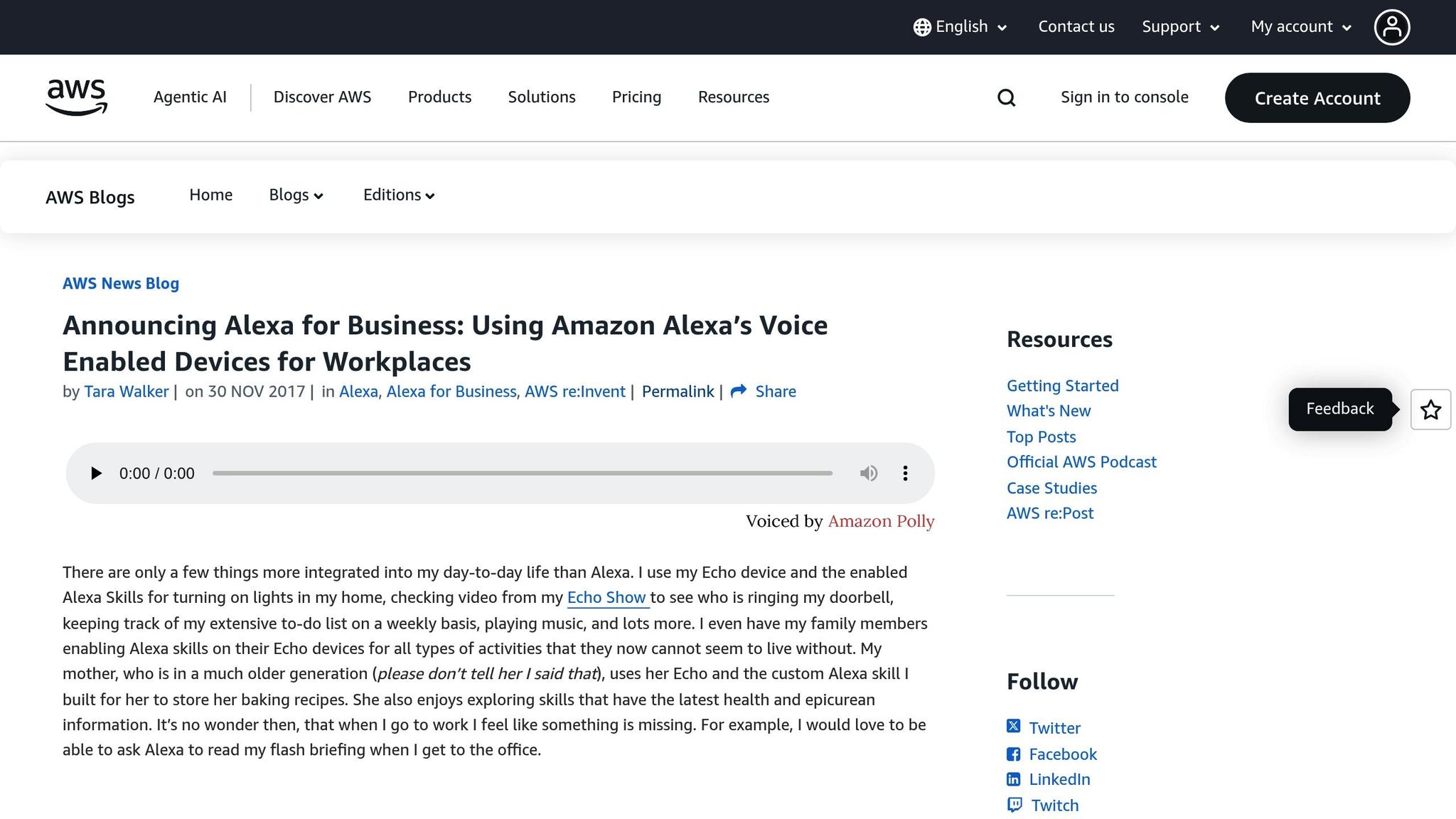
Amazon Alexa for Business brings a voice-driven solution to e-commerce, making it easier for customers to interact with your platform. Whether they’re asking about products, tracking orders, or seeking personalized recommendations, Alexa simplifies the process using natural language. Here’s how it enhances customer support, integrates with e-commerce systems, tracks orders, and creates tailored shopping experiences.
Automating Customer Support
By connecting Alexa for Business to your company’s knowledge base, you can handle routine customer questions through voice commands. For instance, Alexa can answer queries about product details, return policies, or account issues. If a question requires more assistance, Alexa can seamlessly transfer the customer to a live agent, ensuring the context of the conversation is preserved.
Seamless Integration with E-Commerce Platforms
Alexa for Business taps into Amazon’s robust ecosystem to integrate with e-commerce platforms. It connects with systems to provide real-time inventory updates, product details, and even payment processing. Customers can check availability or complete purchases hands-free, leveraging Alexa’s familiar interface and Amazon’s reliable infrastructure.
Voice-Enabled Order Tracking
Tracking orders becomes effortless with Alexa for Business. Customers can simply ask about their order status and receive real-time updates on shipping and delivery. Built on Amazon’s extensive logistics expertise, this feature ensures accurate and up-to-date tracking information through the trusted Alexa platform.
Creating Personalized Shopping Experiences
Alexa for Business enhances personalization by recognizing returning customers, making tailored recommendations, and supporting quick reorders. This voice-first approach boosts customer engagement by combining Amazon’s advanced voice recognition with the widespread use of Alexa devices in American homes, delivering a shopping experience that feels tailored and convenient.
sbb-itb-212c9ea
5. Azure AI Speech
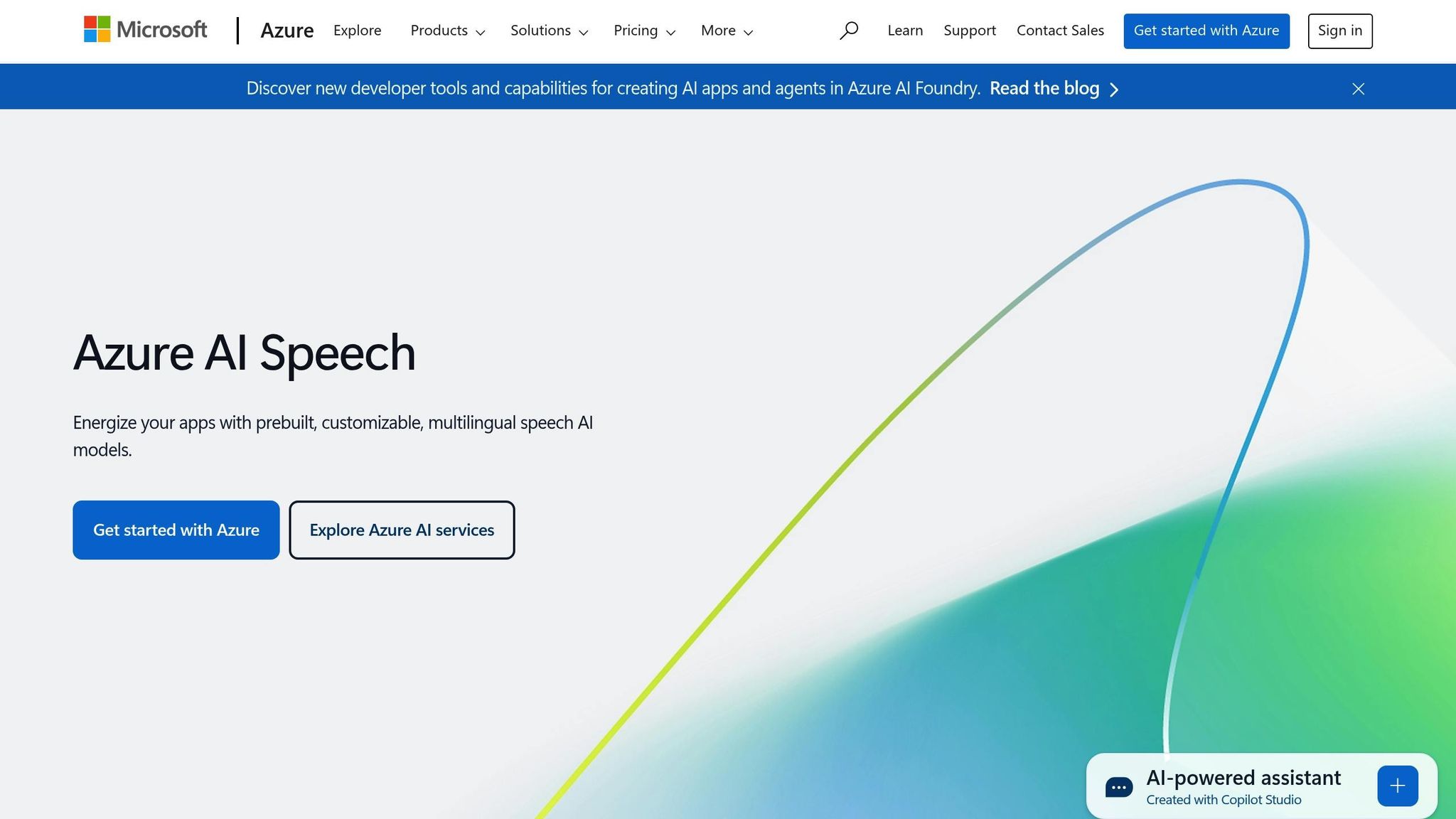
Azure AI Speech is a cloud-based voice solution designed to deliver high-quality speech recognition and synthesis. It supports multiple languages and allows for customizable voice models, making it well-suited for handling industry-specific terminology.
Customer Support Automation
Azure AI Speech shines in automating customer support tasks with its powerful speech-to-text and text-to-speech features. For common inquiries like product details, returns, or account issues, it converts spoken words into text, enabling automated systems to process requests seamlessly.
By using custom speech models and real-time transcription, the service reduces errors and speeds up resolutions. These models can be trained on your product catalog and customer service scripts, ensuring higher accuracy in understanding customer needs. This means fewer miscommunications and faster solutions. Plus, live agents benefit from seeing precise transcriptions of customer queries, enabling them to respond quickly and effectively.
These speech tools integrate directly with existing e-commerce systems, providing a streamlined experience for both businesses and their customers.
Integration with E-Commerce Platforms
Azure AI Speech offers an API suite and SDKs that make it easy to integrate with popular platforms like Shopify and WooCommerce. It efficiently handles large volumes of voice data, allowing developers to embed voice functionality into mobile apps, websites, and customer service portals. This scalability is a game-changer for e-commerce businesses looking to analyze customer interactions as they grow.
Personalized Shopping Experiences
Beyond support and integration, Azure AI Speech enhances shopping experiences by personalizing interactions. Through speaker recognition, the service identifies returning customers, accessing their purchase history to deliver tailored recommendations. This feature is particularly useful for hands-free shopping scenarios - like when someone is cooking and needs to reorder groceries.
Additionally, neural voice technology allows businesses to create custom brand voices that align with their identity. Whether the desired tone is friendly and casual or professional and authoritative, these unique voice personas help reinforce brand identity. Consistent voice interactions across all touchpoints foster stronger customer relationships and improve brand recognition in the process.
6. Otter.ai
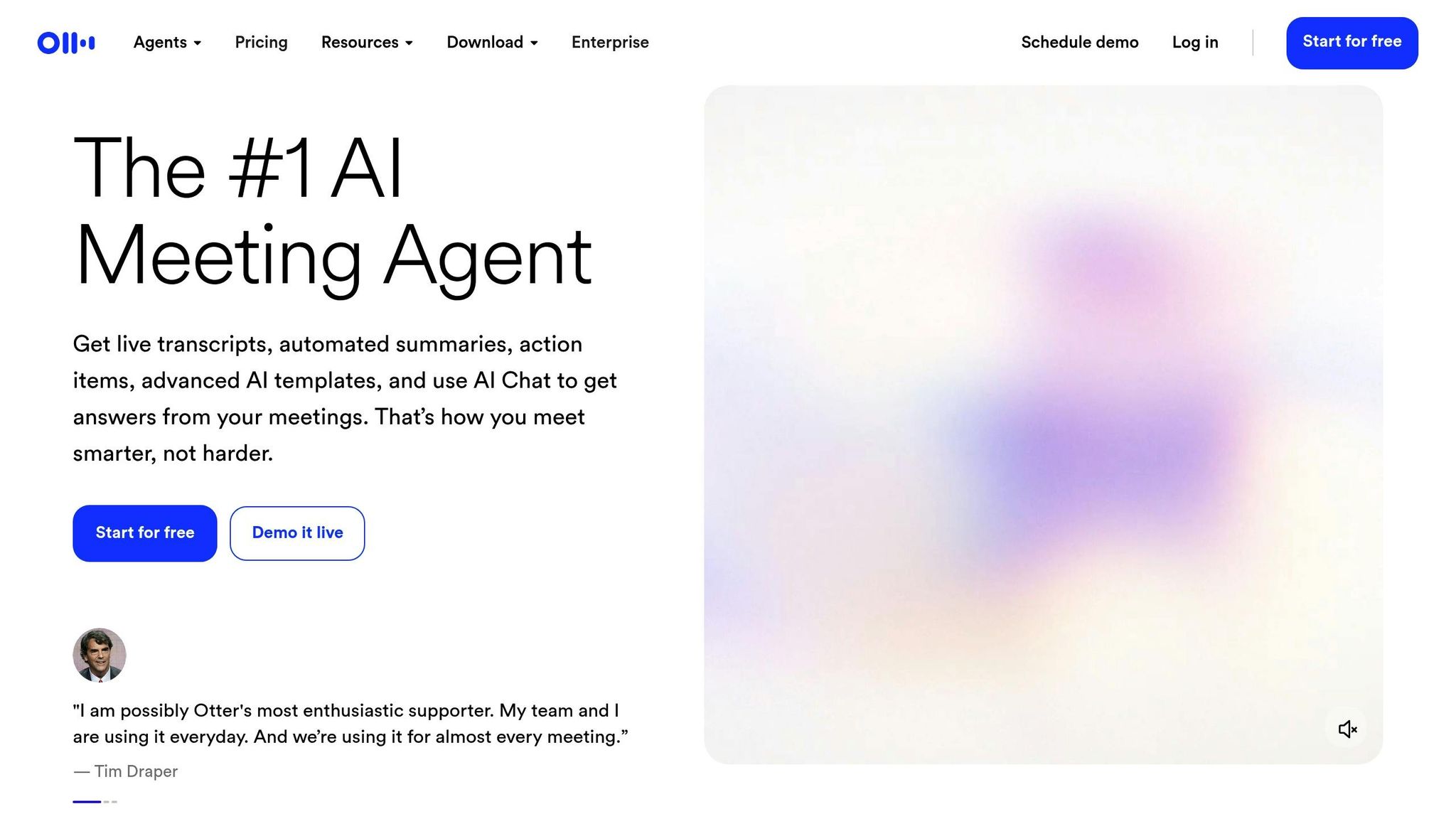
Otter.ai is a transcription service powered by AI, designed to convert spoken conversations into searchable text. While it's widely recognized for transcribing meetings, it also plays a role in e-commerce, where precise voice-to-text conversion is crucial for managing customer interactions.
Streamlining Customer Support
Otter.ai improves customer support by providing real-time transcription of customer calls. Its speaker identification feature ensures that different voices are clearly distinguished. Support teams can use these detailed transcripts to review conversations, which is especially helpful for training purposes. Managers can also quickly analyze transcripts to identify recurring issues or patterns, making it easier to address common customer concerns.
Seamless Integration with E-Commerce Tools
Otter.ai works with popular video conferencing platforms, enabling customer service teams to automatically transcribe video calls. This ensures that every important detail from customer interactions is accurately recorded. Beyond documentation, these integrations help create opportunities for more personalized customer service by maintaining a detailed record of conversations.
Supporting Personalized Experiences
While transcription is Otter.ai’s main focus, its detailed conversation records offer more than just documentation. By keeping a history of customer interactions, representatives can reference past conversations to provide responses that feel tailored and relevant to the customer’s needs. This level of personalization can significantly enhance the customer experience.
7. Google Dialogflow
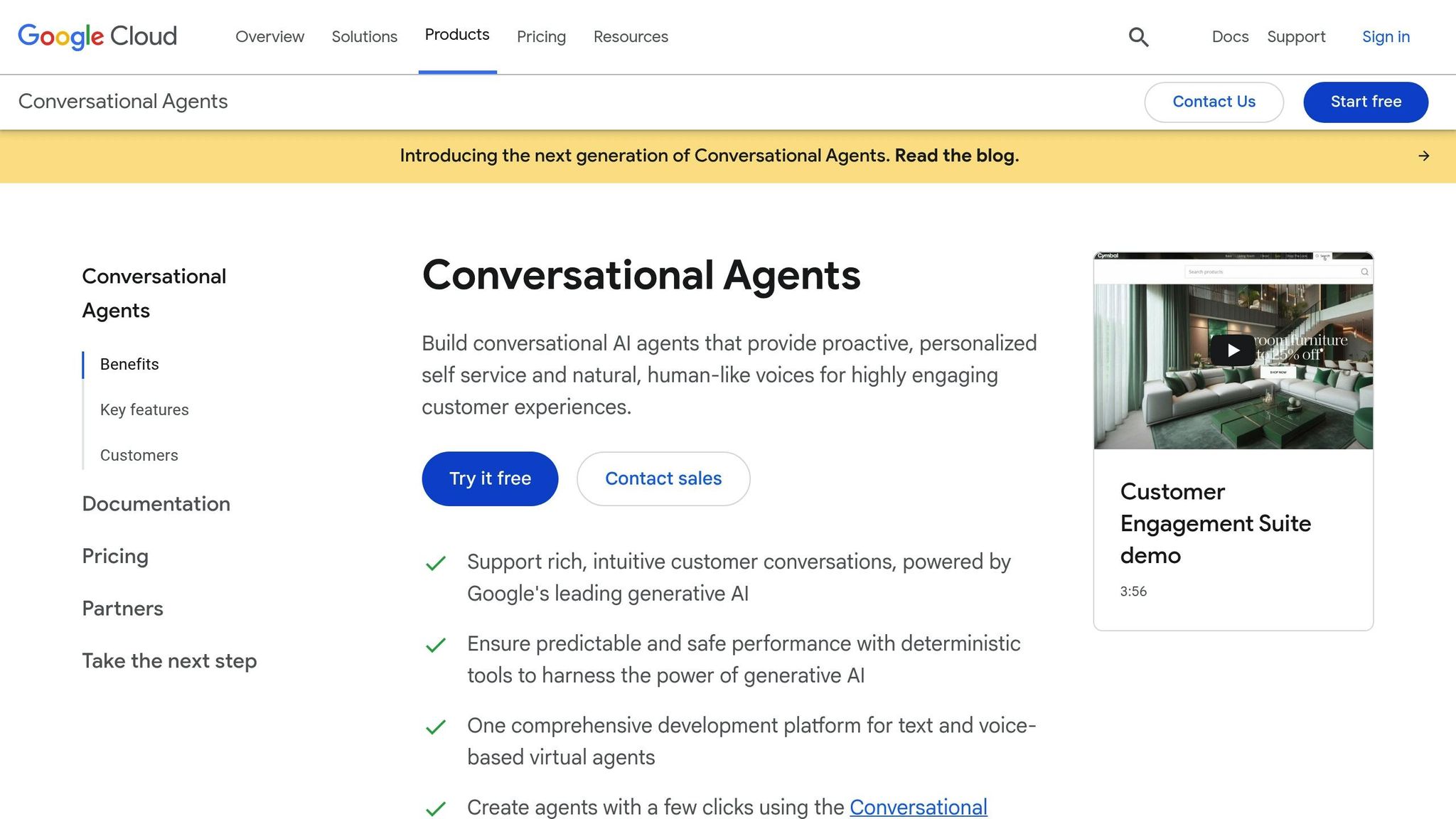
Google Dialogflow is a powerful conversational AI platform designed to help e-commerce businesses create chatbots and voice assistants. By utilizing natural language processing, this cloud-based service understands customer intent and provides relevant responses across various channels, making customer interactions more efficient and automated.
Customer Support Automation
Dialogflow's conversational design turns routine customer inquiries into seamless support experiences. It can handle complex questions by interpreting customer intent, and its machine learning capabilities allow it to improve over time. The platform supports multi-turn conversations, meaning customers can naturally ask follow-up questions. For example, a customer might inquire about return policies and then follow up by asking about product availability. Dialogflow keeps track of the conversation's context, ensuring responses remain accurate and helpful.
Additionally, businesses can create custom intents tailored to their specific products and services. This flexibility makes it easier to address industry-specific language and meet unique customer needs, elevating the overall support experience.
Order Tracking Capabilities
With integration into e-commerce systems, Dialogflow provides real-time order tracking. Customers can receive up-to-the-minute updates on their orders directly from the database. This hands-free, convenient solution is especially useful for mobile users who want to stay informed without extra effort.
Integration with E-Commerce Platforms
Dialogflow seamlessly integrates with popular e-commerce platforms like Shopify, WooCommerce, and Magento. These connections allow it to access product catalogs, inventory levels, and customer data in real time. Beyond e-commerce platforms, Dialogflow works with messaging channels such as Facebook Messenger, WhatsApp, and Slack, ensuring businesses can interact with customers on their preferred platforms.
Through its API connectivity, Dialogflow can also integrate with existing CRM systems and help desk software. This ensures a smooth transition to human agents when needed, providing a consistent and professional customer experience.
Personalized Shopping Experiences
Using customer data, Dialogflow enhances shopping experiences by offering tailored product recommendations. It can suggest complementary items, highlight relevant sales, and personalize notifications based on purchase history and preferences, making the shopping journey more engaging and customer-focused.
Feature and Pricing Comparison
Choosing the right AI voice tool depends on your goals, budget, and technical needs. Whether you're looking for a simple, affordable option or a robust, enterprise-level system, there's something for every business size. Here's a quick breakdown:
Basic platforms focus on offering core voice features and dependable support at competitive prices. They’re ideal for smaller businesses or those just starting with AI voice technology. Mid-tier solutions step things up with pre-built integrations and easier setups, making them a good choice for growing businesses seeking efficiency. For larger enterprises, advanced tools provide cutting-edge AI capabilities, scalable performance, and adaptable pricing models - but they often require more technical resources to manage.
Think about what matters most to your e-commerce strategy - fast deployment, seamless integrations, or top-tier features - and match those priorities to the tool that fits best.
Conclusion
The best AI voice tool should work effortlessly with your existing systems while enhancing the customer experience. Look for a solution that simplifies support, automates repetitive tasks, and tailors shopping experiences to individual customers. Pay close attention to features like integration and tracking when comparing platforms.
To make the selection process easier, you can explore AI Apps, a centralized marketplace featuring over 1,000 AI tools tailored for e-commerce. This platform allows you to filter by industry needs, including categories like "Customer Service Representatives" and "AI Business Tools", helping you find voice tools that align with your specific requirements.
Investing in the right AI voice technology can transform your business. Start by assessing your challenges, goals, and technical capabilities. The right tool will empower your business to consistently deliver efficient and personalized customer service, setting you up for long-term success.
FAQs
How do AI voice tools enhance customer support for e-commerce businesses?
AI voice tools are transforming customer support in e-commerce by ensuring round-the-clock availability. This means customers can get assistance anytime they need it, without unnecessary delays. These tools are particularly effective at managing routine inquiries, cutting down wait times, and allowing human agents to concentrate on more challenging or unique problems.
What’s more, AI voice tools excel at delivering personalized support. By leveraging customer data, they provide tailored solutions that make the shopping experience smoother and more enjoyable. Automating repetitive tasks not only speeds up response times but also helps businesses lower operational costs while increasing customer satisfaction.
What should I look for when selecting an AI voice tool for my e-commerce business?
When choosing an AI voice tool for your e-commerce business, it's essential to prioritize features and compatibility with your existing platform. Aim for tools that integrate effortlessly, offer strong security measures, and provide customization options tailored to your business requirements.
It's also important to evaluate the tool's ability to grow with your business. Look for solutions that are reliable in performance and adhere to data privacy standards, ensuring your customers' trust remains intact. These considerations will help you improve customer interactions while staying aligned with your overall business objectives.
How do AI voice tools enhance the shopping experience in e-commerce?
AI voice tools transform the shopping experience by using customer data - like browsing habits and previous purchases - to offer tailored product recommendations. These tools engage with customers in real-time, answering queries, suggesting products that fit their preferences, and guiding them step-by-step through the shopping process.
With their ability to provide instant, customized support, AI voice tools boost customer interaction, simplify decision-making, and make the overall shopping journey smoother and more enjoyable.



